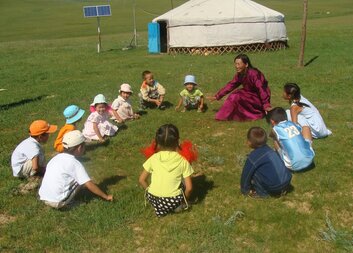Although Mongolia is well on the way to achieving the third Millennium Development goal of universal education, there are still some education issues which need to be addressed, such as the disparity between urban and rural areas, less than half of pre-school age children enrolled in kindergartens or alternative forms of early childhood development and low rate of enrolment in school and kindergarten of children with physically and developmental challenges in 2008. In the period following the cessation of Soviet support for the education system in Mongolia in 1991, there was a severe decline in the provision of pre-school education.
However the Mongolian Ministry of Education, Culture and Science has made good progress in reversing this situation, there are still some problems facing the provision of pre-school education in rural and remote areas and in particular in the nomadic communities. The combination of very severe winters, great distance from the nearest settlements and the unpredictability of grazing location in the spring and summer pose great difficulties in providing pre-school education, even using parentally run, home-based education. Communications are difficult and expensive and travelling can be long, tiresome, expensive and, on occasion dangerous.
In order to tackle these problems, CCR implemented the Socio – Economic Stabilization of Geographically and Socially Isolated Communities” project, supported by the Ministry of Education of Mongolia and its organization bodies, along with “National Centre for Non-formal and Distance Education“ from 2008 to 2009.
Education is made accessible to the chosen communities of Bulgan province (the project concentrates specifically onto education of children in early childhood age, including school drop-outs and disabled children) in their home environment by means of implementation and providing education in form of interactive radio communication.
Field social services are made accessible to the chosen communities of Bulgan province by means of experienced students of social work traineeships, by means of training, practice and integration of the local social workers and NGO experts from Ulaanbaatar.
The general objective of the project was the improvement of living conditions and increase in the amount and quality of provided services within the herdsmen communities in Bulgan aimag. We wanted to enable education for children from rural and distant areas of the country in form of coordinated radio-communicative lessons and to improve local social services with the help of local social workers and by integration of young social work students who otherwise have little possibility for direct social work in the countryside. This method of teaching is in this stage meant for the little children between 3-5 years of age who don´t attend the kindergarten and also for school drop-outs and disabled children. The purpose of this project was to support children´s physical, intellectual and social development and prepare them for school attendance through comprehensive care, protection, education and disciplining activities. Another purpose of the project was to give the opportunity for a second chance for children who have dropped out the school.
Direct target groups
- Children from remote areas of Mongolian countryside (province Bulgan).
- Parents and families of these children.
- Social workers – students.
- Social workers – professionals working in the countryside.
- Pedagogues providing elementary education in distant Mongolian rural areas.
- Representatives of rural communities.





